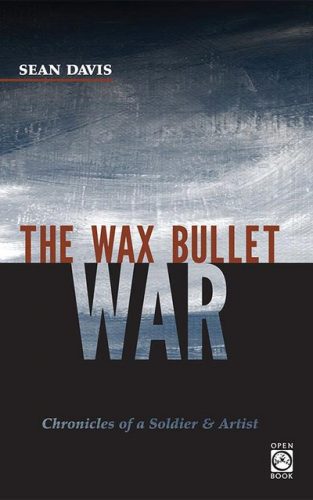
In a scene about two-thirds of the way through his debut memoir The Wax Bullet War (Ooligan Press. 2014. $16.95), Sean Davis finds himself standing — hungover and “clouded with drugs”— on a stage at Walker Middle School in Salem, Oregon. Davis, who only months before had been critically injured by an IED attack in Iraq, an attack that also claimed the life of his closest friend, is at the school to share some of his experiences, as well as to generate support for the troops who are still deployed.
As he stares at the crowd, Davis struggles to find something to say. His superior has told him to talk about some of the “good points” of the war, something to contrast all the horrible stuff being shown on the news. But Davis is struck by all the waiting faces, “those little faces that hadn’t even grown out of their baby fat,” all of them looking to him for something. When he’s finally able to get out some words, he simply says, “I wanted to be an artist when I grew up.” It’s a confession that prompts a round of laughter. After a few more awkward words, Davis jettisons the microphone and flees for the parking lot.
This tension — the tension between the artist and the infantryman in Davis — is much of what drives his book. The story begins the morning of the deadly IED attack, but then quickly backtracks to Sept. 11, 2001, and Davis’s decision to return to military life. As Davis describes it, he was 28 years old and had been out of the Army for two and a half years after a six-year stint. “In all that time,” he writes, “I had never once thought about reenlisting, but the next day I jumped in my beat-up white Toyota and drove off to join the Oregon National Guard.”
What follows is not a jingoist tale of the U.S. saving the day, nor is it a pat dismissal of all military action as bad. Instead, in straightforward and evocative prose, Davis delivers an honest look into his life as a soldier — before, during and after combat in Iraq. While Davis doesn’t ignore politics — one of the book’s most well-rendered scenes involves him being selected to attend a surreal photo-op luncheon with President Bush — he’s also careful to not let his story be overwhelmed by them. And it’s this larger, more nuanced picture — this examination of war’s lingering effects on friends, families, and communities — that is one of the book’s biggest strengths.
When he returns to Oregon, “bone-broke, bruised, and soul-wrecked,” Davis’s more difficult fight begins. Having joined the military so his life might make sense again, Davis becomes unmoored. The Purple Heart recipient now sits stateside, suicidal, while the rest of his company finishes out its tour. In talking about his struggles with PTSD, and the guilt he feels over his friend’s death, Davis’s writing is unflinching. One of Davis’s fears in combat was that he’d shit himself, but it’s not until he gets back home and is drinking himself to sleep every night that he actually does so.
In the end, art does save Davis. One criticism of the book might be that Davis doesn’t delineate this part of the story as clearly as he does the rest. After recounting his time serving in post-Katrina New Orleans, Davis jumps his story ahead five years to 2011, where he’s now married, has a 2-year-old daughter and a MFA. This isn’t some happily-ever-after tale, however. Physical and emotional injuries have left permanent damage. “The nightmares don’t go away,” Davis writes.
Ultimately, The Wax Bullet War is a testament to the healing power of art and words, and to the connections we share as humans. The artist inside Davis finally did what the soldier could not. “The artist found a new purpose,” Davis writes, “and something to live for.”
Sean Davis speaks at Powell’s City of Books, Burnside, Portland, 7:30 pm May 27. Eliot Treichel is the author of Close is Fine, also published by Ooligan Press.